Walsall F.C.
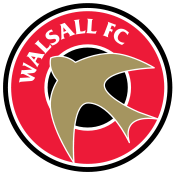 |
|||
| Full name | Walsall Football Club | ||
|---|---|---|---|
| Nickname(s) | The Saddlers | ||
| Founded | 1888 (as Walsall Town Swifts) | ||
| Ground | The Banks' Stadium, Walsall (Capacity: 11,300) |
||
| Chairman | Jeff Bonser | ||
| Manager | Chris Hutchings | ||
| League | League One | ||
| 2009–10 | League One, 10th | ||
|
|||
Walsall Football Club (pronounced /ˈwɔːlsɔːl/) are an English football club based in Walsall, West Midlands. They currently play in League One. The club was founded in 1888 as Walsall Town Swifts, an amalgamation of Walsall Town F.C. and Walsall Swifts F.C. The club were one of the founder members of the Second Division in 1892, but have spent their entire existence outside of English football's top division; their highest league finish was sixth in Division Two in 1898–99.
Walsall moved into their Bescot Stadium in 1990, having previously played at nearby Fellows Park. Their opening game was a friendly fixture against local rivals Aston Villa, with Villa winning 4–0. The ground is now known as Banks's Stadium for sponsorship purposes.[1] The team play in a red and white kit and their club crest features a swift. They have rivalries with neighbouring Black Country teams, West Bromwich Albion and Wolverhampton Wanderers (though these teams are often more concerned with their rivalry against each other, rather than against Walsall), with more 'reciprocal' rivalries against Shrewsbury Town and Port Vale. The club's nickname, The Saddlers, reflects Walsall's status as a traditional centre for saddle manufacture.
Contents |
History
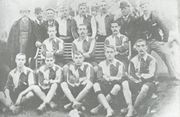
Walsall were formed as Walsall Town Swifts in 1888 when Walsall Town F.C. and Walsall Swifts F.C. amalgamated. Walsall Town had been founded in 1877 and Walsall Swifts in 1879. Walsall Town Swifts' first match was a draw against Aston Villa. In 1889 Town Swifts' first England international, Albert Aldridge was capped twice by his country. The club were first admitted to the Football League in 1892, as founder members of the new Second Division, but in 1894–95 finished 14th out of 16 teams and failed to be re-elected to the Football League. They changed their name to Walsall F.C. and joined the Midland League.
Walsall's highest "home" attendance was set in 1930, when they played in of front of 74,600 fans against Aston Villa in the FA Cup Fourth Round. Although a home match for Walsall, the tie was played at their opponents' Villa Park ground, and it remains the highest attendance that Walsall have ever played in front of. Walsall was a founding member of the Third Division North in 1921. In 1933 won 2–0 in the FA Cup against Arsenal, who went on to win the First Division that season.
In 1958, following a reorganisation of the Football League, Walsall became founder members of the Fourth Division. Under the management of Bill Moore, the club achieved successive promotions, scoring 102 goals on their way to winning Division Four in 1959–60 and finishing as Division Three runners-up in 1960–61 to reach the second tier of English football for the first time since the early 1900s. Players such as Bill 'Chopper' Guttridge, Tony Richards and Colin Taylor were intrinsically important to the success of the side. After just two seasons in the Second Division, the club were relegated back to Division Three in 1962–63, and remained there until a further demotion to the Fourth Division, in 1978–79.
The club has always had a rich history of producing players who go on to play at the top level. Allan Clarke went on to win the League Championship under Don Revie at Leeds United after beginning life at Fellows Park. Bert Williams and Phil Parkes both became England Goalkeepers in the years after they progressed from their roots in Walsall. David Kelly had a long career at the top level after leaving Walsall in 1988, representing the Republic of Ireland at the very highest level of international football. More recently, Michael Ricketts represented England after blossoming at Bolton Wanderers. In recent years, Matty Fryatt and Ishmel Demontagnac have both represented England age-groups.
The 1980s were a period of considerable activity for Walsall. In 1983–84 they defeated First Division club Arsenal in League Cup play, and advanced to the semi-final, where they gained a 2–2 draw against Liverpool at Anfield, but lost the second leg 2–0 and the tie 4–2 on aggregate. Walsall narrowly missed out on promotion in the same season.
In 1986 plans were announced to move Walsall to Birmingham, to groundshare with Birmingham City. The town rallied behind Barrie Blower, who led a campaign to save the club. Walsall were subsequently bought by millionaire entrepreneur and race-horse owner Terry Ramsden and with his money came high profile signings and the attention of the national media. In 1986–87, under new manager Tommy Coakley, Walsall narrowly missed the playoffs, but made considerable progress in the FA Cup as they defeated First Division Charlton Athletic and Birmingham City and took Watford to two replays in the fifth round. Walsall earned promotion through the old Division Three play-offs in 1988, beating Bristol City in a replayed final. 1988–89 saw the club relegated from Division Two and Ramsden's business empire collapsed alongside the Japanese Stock Exchange. Walsall were minutes from being taken over by Japanese Administrators and folded, but survived, again through the actions of Barrie Blower and local businessmen.
Further relegation followed at the end of 1989–90 as Walsall were consigned to Division Four. The club moved to the Bescot Stadium in 1990. At the time it was a state-of-the-art arena, and was only the second new Football League ground since the 1950s. A Morrison's supermarket was built on the site of the old Fellows Park ground. The arrival at Bescot Stadium saw some stability brought back to the club after two successive relegations. Ex-Wolves star Kenny Hibbitt managed the club for four years, setting the groundwork for a golden era for the club that would follow soon after his dismissal in September 1994.
New manager Chris Nicholl led the club to promotion in his first season, building the nucleus of a strong and under-rated team. Two seasons of stability followed, before Nicholl resigned in 1997, citing family reasons and the fact that he felt the club had progressed as far as he could take it on the limited funds available to a lower-league football club.
Ex-Ajax and Danish International Jan Sorensen took the helm after departure. Whilst 'The Saddlers' finished 19th in Division Two that season, the club reached the 4th Round of the League Cup (beating Nottingham Forest and Sheffield United along the way), as well as rampaging through the early rounds of the FA Cup. Lincoln United were dispatched in the first round, whilst league newcomers Macclesfield Town (who until then had been unbeaten at home in all competitions) were beaten 7–0. Peterborough United, who themselves have a rich cup pedigree, were beaten on a bitterly cold Tuesday evening to set up a tie away at Manchester United. Walsall lost 5–1. Sorensen's tenure was marked by the signing of two of the finest players ever to pull on a Walsall shirt. Ivory Coast born striker Roger Boli started the season in superb form, becoming a marked man for much of the season which dampened his predatory instincts. However, Boli's fellow Frenchman, Jean Francois 'Jeff' Peron was a shining light in an otherwise poor league. Despite being 32 when arriving in England, Bescot was home to scouts from the Premiership and Division One as Peron's reputation grew. Though he only scored one goal in his solitary season for The Saddlers, he is best remembered for his mesmerising ability with the ball at his feet and the exceptional performance which tore Macclesfield Town to pieces in the aforementioned FA Cup tie.
In 1998–99, ex-Aston Villa winger Ray Graydon took over as manager and led the club to a runners-up spot in Division Two.[2] They were relegated on the final day of the following season, despite derby wins over local rivals Wolverhampton Wanderers, Birmingham City and West Bromwich Albion earlier in the campaign.
However, The Saddlers returned to the second-tier of English Football at the first attempt, defeating Reading 3–2, after extra time, in a thrilling Play-off Final at Cardiff's Millennium Stadium.[3] After a promising start to the season, the form began to slip away over the winter period. However, the signings of Fitzroy Simpson and Don Goodman added much needed steel to the side and spured them on to reach Division One once again.
Despite all the success he had delivered, it soon became clear that Ray Graydon had reached the end of the road at the club. In a controversial decision that brought with it the wrath of fans and the national media, owner Jeff 'I'm your saviour' Bonser dismissed Graydon after an abject performance live on Sky TV against local rivals, West Bromwich Albion. His replacement, ex-Wolves manager Colin Lee polarised supporters, but ultimately proved to be a success. The style of football improved, and Lee's signings improved the team dramatically. Relegation was avoided thanks to vital away wins against Nottingham Forest and Sheffield United, and the new spirit in the squad was typified by a vital last-gasp equaliser away at fellow strugglers Grimsby Town (who also beat the drop).
The next two seasons were a mixed bag. Lee improved the club immeasurably off the field, allowing it to fulfil part of the huge potential it has. On the pitch some rather dull performances were dotted in between some inspiring football. Again, relegation was avoided in the 2002–03 season because of the signing of key players, such as ex-Tottenham midfielder Vinny Samways who returned from a six-year spell in Spain to help the Walsall cause. Samways slotted into a side which many believe was the most talented Walsall team since the clubs golden era under Bill Moore in the late 1950s and early 1960s.
2003–04 proved to be one of the most remarkable seasons in the club's history. Up until the New Year Walsall were flying. West Bromwich Albion and Nottingham Forest were both destroyed 4–1, as new-signing, the ex-England and Arsenal star, Paul Merson seemed to be repeating some of the magic that had led Portsmouth to promotion the previous season. Following a Boxing Day victory at Cardiff City, the club sat just four points off a place in the play-offs. It wasn't to last though.
2004 saw a spectacular slump in form. The New Year began with a disappointing FA Cup Third Round defeat away at Millwall, which saw Jimmy Walker dismissed for throwing a punch at Dennis Wise. Walker's replacement Andy Petterson slotted in for a home debut against fellow-strugglers Coventry City. The Saddlers capitulated, losing 6–1. The following weeks saw costly defeats, and it took until 13 March for the club to win their first league game of 2004. The cause was not helped by a recurrence in Paul Merson's well publicised addiction to alcohol and gambling, and though he travelled to a clinic in the United States with the best will of the club and its fans, it is indubitable that his absence took away the talismanic influence of one of the most influential players in recent footballing history.
Colin Lee was sacked after a shambolic display at Gillingham – though the reason given for his dismissal was his decision to speak to Plymouth Argyle about their vacant manger's position. Lee had been disillusioned by club owner Jeff '£400k a year in rent' Bonser, who had blocked the funds needed for the signing of players who proceeded to be a success at other clubs in the League.
Lee was replaced on a temporary basis by Merson, who was assisted by Simon Osborn. Despite the rallying cries of the ex-England international Merson, and the backing of the town, Walsall won only one more game that season, and were relegated, agonisingly by a single goal. On the final day of the season, Rotherham United were visitors at the Bescot Stadium. If Walsall won and Stoke City beat Gillingham in their home tie, Walsall would have stayed up. The Saddlers beat Rotherham United 3–2, and many fans invaded the pitch upon the final whistle, believing that they had avoided relegation, but as news of a 0–0 draw at Stoke City filtered into the ground, the worst was confirmed. Walsall's relegation left many Saddlers' fans asking themselves just what had gone wrong.
Merson was immediately appointed as full-time manager of the club in May 2004. Almost as soon as he arrived, rumours started to circulate that he would soon be sacked, polarising Walsall fans who were either behind him or against him. However, despite the question mark which hung over his tactical astuteness, he brought on and developed a number of young players who look set to have a big future in the game. Among those introduced to regular first team football by Merson, the brightest light is Matty Fryatt, who was the Top Scorer at the 2005 European Under-19 Championship where he represented England. His strike rate at Walsall was better than the majority of Strikers in both the Championship and League One. Paul Merson vowed not to stand in his way should a 'big club' come in for him, and it came as no surprise when in January 2006 Fryatt left the club, signing for Leicester City in a deal worth £350,000.
Merson's reign as Walsall manager came to an end on 6 February 2006, sacked by Chief Executive Roy Whalley after refusing to resign. Two days earlier Walsall had lost 5–0 for the third time in Merson's reign, providing an interesting symmetry to his spell in charge – his first game was a 5–0 defeat away at Norwich City, whilst his final game resulted in a 5 goal reverse at Brentford.
Long-serving Youth Team manager Mick Halsall was put in Caretaker control of the Football Club, but ruled himself out of any long term ambitions for the job. Former Walsall player David Kelly was the bookies' favourite for the job, but ex-manager Chris Nicholl put his name into the running hours after news broke of Merson's dismissal.
On 17 February, whilst speaking to a local news broadcast, Jeff 'Holy Saviour of Walsall F.C' Bonser seemed to suggest that he would be keen to see Merson return to Bescot Stadium as a player, stating "a fit Paul Merson is an asset to any side". However, Merson would seem to be keener on following personal business interests at this time, taking a break from football until the summer. The practicalities of a former manager returning of a player have been tested before, most notably when Andy Hessenthaler resigned as manager of Gillingham in 2004, but remained as a player. However, Merson holds a much higher profile in football than Hessenthaler, and some speculated that it would have undermined caretaker manager Mick Halsall, and any future manager that would be appointed.
Despite all the speculation, there was general shock when, on 22 February 2006, former Birmingham City captain Kevan Broadhurst was appointed as Paul Merson's replacement. Broadhurst had been occasionally linked to the job during the vacancy, but was not considered by bookmakers nor fans to have a serious chance for the job. Broadhurst had a brief loan spell at Fellows Park in Walsall's 1979–80 promotion season. His initial contract was until May 2006 – with the brief to secure Walsall's League One position. Mick Halsall, a former team mate of Broadhurst's, remained with the first team with a view to assisting Broadhurst until the end of the season, when he would return to his original post as Head of Youth.
Walsall were relegated on 22 April 2006 after losing 3–1 to Huddersfield Town. Rotherham United's 1–1 draw with Scunthorpe United saw an unassailable gap of seven points formed. Broadhurst was sacked the next day. Player coach Mark Kinsella was put in charge for the final two matches of the season, with Halsall reverting to duties with the reserve and youth teams. On 3 May, the team appointed their fifth manager of the season in former Scunthorpe manager Richard Money. Money stated his ambition to get Walsall back into the Coca-Cola Championship.
Richard Money's reign started with a bang. The signings of Martin Butler and Michael Dobson along with other signings gave the club potency to get promoted out of League Two. Walsall lost just once in the first 20 league games, including maximum points from their first 7 home ties. An impressive start to the season was maintained thorughout, and despite a mini-blip in February (including defeats to promotion rivals Hartlepool United and Lincoln City), Walsall remained in the top 3 for almost the entire season. Walsall were promoted into League One on 14 April after beating Notts County 2–1 away from home. On the final day of the season, Walsall drew 1–1 with Swindon Town at the County Ground thanks to a last-minute goal by Dean Keates in front of 3,419 travelling fans. With Hartlepool United losing their match against play-off chasing Bristol Rovers, Walsall were awarded the League Two title.[4][5]
On 24 April 2007 Walsall announced a 'New Change' with major alterations: a new Kit Sponsor revealing that Banks's would no longer be Walsall Football Clubs official Sponsor for the 2007–08 season, and that Easy Fit Conservatories would be the new kit sponsor, a new kit manufacturer which is to be Mann Brothers (previously Nike), and the biggest change, the club badge which was reformed back to the original Round design and Club Swift which has been designed to look more modern. This marks a new change and an exciting time for Walsall Football Club as they get ready for League One Football in 2007–08.
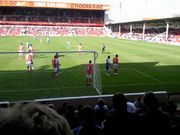
The club performed strongly in 2007–08, a season that included a run of 17 league matches without defeat. However, a January transfer window that culminated in the sales of important first team players Daniel Fox and Scott Dann (both to Coventry City) caused a drop in form throughout 2008. The clubs play-off challenge was ended after a run of poor results in March leading to Richard Money resigning as manager in April. Jimmy Mullen took over as caretaker manager before being given the job on a permanent basis after the club finished in a disappointing 12th place.
Walsall officially opened its new training ground in Essington in July 2008, following two years of development. This gave the club its own dedicated training base for the first time in its history.[1] Walsall endured an inconsistent start to their League One campaign in 2008–09, with a number of home defeats leading to the sacking of manager Jimmy Mullen in January 2009. Mullen was replaced by former Walsall player Chris Hutchings. Hutchings started his reign with a 1–1 home draw with Hereford United. His first win as Walsall manager came against Leeds United on 31 January at Bescot Stadium, with Troy Deeney's first half goal proving enough in an impressive 1–0 win.
2009–10, Hutchings first full season as Walsall manager, started with a 1–0 win at Brighton & Hove Albion. The season was again inconsistent however at the start of December, Walsall were 7th and only a point outside the playoffs. This was followed by four consecutive match postponments due to the Big Freeze of Winter 2009. On 16 January 2010, Walsall played their first match since 19 December. The start of 2010 brought a slump in form. Walsall didn't win until 9 February , a 1–0 away win at Bristol Rovers. The highlight of the season came later in February when Walsall won 2–1 away at Elland Road inflicting Leeds United's first home defeat for 13 months. By the beginning of April, Walsall were 13th with only one win in seven league games. The last eight games brought a striking change in form. Walsall's only defeat came away at Huddersfield after conceding two goals in added time. That said, Walsall won their final game 2–1 at home to MK Dons to seal at top 10 finish their highest since gaining promotion in 2007. Clayton Ince announced his retirement at the end of the season while Troy Deeney top scored with 14 goals.
During the summer of 2010–11, Walsall released many players such as Troy Deeney and Dwayne Mattis. Therefore, in came Johnny Brain, Paul Marshall and Jamie Paterson. The season started with a 2–1 defeat to Milton Keynes Dons however, Walsall recorded their first win the next weekend by winning 2–1 at Brentford The next weekend saw Walsall gain back to back wins since February 2010 by beating Plymouth Argyle 2-1 with the winner coming from new striker Reuben Reid
A timeline of Walsall's history
- 1888 – Founded as Walsall Town Swifts
- 1896 – Beat Wolverhampton Wanderers to win the Birmingham Senior Cup, and also Aston Villa in the Birmingham Charity Cup final.
- 1896 – Move into the new Hillary Street Ground, which will later become known as Fellows Park – Walsall's home, on and off, until 1990.
- 1933 – Beat Arsenal in the FA Cup – a result still regarded as one of the greatest FA Cup upsets of all-time.
- 1972 – Club rescued from financial oblivion by new owner Ken Wheldon.
- 1975 – Defeat Manchester United and Newcastle United in the FA Cup on the way to the Fifth Round. The winning goal against Newcastle is scored by striker George Andrews.
- 1978 – Defeat Leicester City in the FA Cup on the way to the Fifth Round.
- 1979 – Sign striker Alan Buckley back from Birmingham City for a club record £175,000. He becomes player-manager soon after.
- 1984 – Walsall reach the League Cup semi-finals, defeating Arsenal in the fourth round, but manager Alan Buckley is sacked for failing to guide the club into the Second Division.
- 1986 – Racecourse owner Terry Ramsden buys the club.
- 1988 – Promotion to the Second Division is achieved.
- 1989 – Relegation to Third Division after just one season in the second.
- 1990 – A second successive relegation sees Walsall relegated to the Fourth Division, and they moved into their new Bescot Stadium a few hundred yards from Fellows Park.
- 1992 – Jeff Bonser buys the club, which again was minutes away from entering receivership. Players were told to find new clubs, and staff were told to clear their desks before Bonser's last minute save.He appoints KENNY HIBBIT (ex Wolves) as Manager. They remain members of the Fourth Division which is rebranded Division Three on the creation of the Premier League.
- 1994 – Chris Nicholl is appointed manager.
- 1995 – Walsall take Premier League club Leeds United to a replay in the third round of the FA Cup. They also win promotion to Division Two.
- 1997 – Chris Nicholl resigns as manager to be succeeded by Jan Sorensen.
- 1998 – Walsall reach the fourth round of the FA Cup where they lost 5–1 to Manchester United at Old Trafford. Jan Sorensen resigns at the end of the season and is succeeded by Ray Graydon.
- 1999 – Walsall win promotion to Division One.
- 2000 – Walsall are relegated to Division Two, being pipped to survival by local rivals West Bromwich Albion.
- 2001 – Walsall climb back to Division One at the first attempt, winning the Division Two playoffs.
- 2002 – Ray Graydon is sacked as manager and replaced by Colin Lee.
- 2003 – Walsall sign 35-year-old former Arsenal and England midfielder Paul Merson and beat West Bromwich Albion on the first day of the new league season.
- 2004 – Walsall are relegated from Division One shortly after the dismissal of Colin Lee as manager. Paul Merson takes over as player-manager. They become members of the newly-named League One (formerly Division Two) after a reorganisation of the Football League.
- 2005 – Paul Merson is sacked after just over a year as manager and is replaced by Kevan Broadhurst.
- 2006 – Walsall are relegated to League Two and Kevin Broadhurst is sacked as manager to be replaced by Richard Money.
- 2007 – Walsall win the League Two title and are promoted to League One.
- 2008 – Walsall achieve a top half finish in League One but Richard Money resigns at the end of the season and is replaced by Jimmy Mullen.
- 2009 – Walsall survive in League One after Jimmy Mullen was sacked as manager and Chris Hutchings replaces him.
- 2010 – Walsall finish in the top 10 in League One for the first time since promotion in 2007
- 2010 – Several players are either released, leave or retire in the summer of 2010 including Rene Gilmartin, Clayton Ince, Jamie Vincent, Mark Hughes, Sam Parkin and Dwayne Mattis
- 2010 – Troy Deeney is sold to Watford on Friday 6 August for a reported fee of £650k
2010 Protests
During April and May 2010, a number of fans began protesting against club owner Jeff Bonser. The protest group, named 'Unity' staged themed peaceful protests during the last 4 home games of the 2009–10 season aimed at raising awareness of the financial situation Walsall F.C finds itself in. Themes used included the use of Cyprus flags and the colour yellow. The protests centred around the ownership of the Bescot Stadium site, on which the club pay a yearly rent circa £360,000. The rent is paid to a Self Invested Personal Pension (Source: Yearly accounts), of which one of the trustees is club owner Jeff Bonser – a situation which some fans feel damages the club.
In April 2010 season ticket holders Neil Ravenscroft and Darren Rhodes were given indefinite bans from Bescot Stadium for their involvement, or perceived involvement in the Unity protests. Another fan, Wayne Swift, was also banned for his part in the protest.
At the final game of the 2009–10 season, against MK Dons on 8 May, a large banner which read 'FREEDOM OF SPEECH' was unfurled during the half time interval as an ironic protest against the club's harsh and unfair treatment of protesting fans. The owner of the banner was then forcefully ejected by stewards.[6] The banner was removed by stewards after a few minutes, and the person who unfurled the banner was ejected from the ground and banned. On 19 May 2010, When Saturday Comes, the popular football magazine and website, published an article written by the owner of the 'freedom of speech' banner, explaining the events which surrounded the unfurling of the banner.[7]
Football supporters websites the Football Supporters Federation and TwoHundredPercent have heavily criticised the club for their stance on the protests and the treatment of those taking part.[8][9]
Walsall in film and television
- In the film Fever Pitch, the day Arsenal were beaten by Walsall in the League Cup Fourth Round in 1984 is mentioned by Mark Strong as Steve during a game of pool with Colin Firth as Paul.
- 1970s BBC comedy television series Ripping Yarns: "I didn't come here on a free transfer from Walsall ...."
Grounds
Fellows Park
Fellows Park was a former football stadium in Walsall, England. It was the home ground of Walsall F.C. from 1896 till 1990, when the team moved to the Bescot Stadium.
Bescot Stadium
The Bescot Stadium (currently known as Banks's Stadium for sponsorship purposes), situated in Bescot, Walsall, England, is the home ground of Walsall Football Club. It was built in 1990 at a cost of £4.5m, replacing the club's previous ground, Fellows Park, which was located a quarter of a mile away. The ground was opened by Sir Stanley Matthews.
Players
First team squad
Note: Flags indicate national team as has been defined under FIFA eligibility rules. Players may hold more than one non-FIFA nationality.
|
|
Youth and Reserves
For the reserve and youth squads, see Walsall F.C. Youth and Reserves.
Former players
For details on former players, see Category:Walsall F.C. players.
Players of the season

Over the past few years it has become traditional that professional football clubs have a player of the season award, and Walsall Football Club is no different, for a number of years they have allowed supporters to vote for the player who they think deserves the award. The votes are then counted and the award is normally given out at the final home game of the season.
From the 2007–08 season however this is no longer the case. The club instead has a rewards evening for the where all the trophies were given out to the winners meaning it is no longer going to be done at the final home game of the season, which came as a disappointment for those who aren't able to make the awards evening.
There has been no less than 10 winners since the rewards have been introduced to Walsall Football Club and for as far back as the Wikipedia records go there has only been 3 players who have won the award twice, Adrian Viveash, James Walker and Anthony Gerrard.
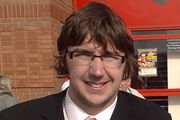
| Name | Season |
|---|---|
| 2009–10 | |
| 2008–09 | |
| 2007–08 | |
| 2006–07 | |
| 2005–06 | |
| 2004–05 | |
| 2003–04 | |
| 2002–03 | |
| 2001–02 | |
| 2000–01 | |
| 1999–2000 | |
| 1998–99 | |
| 1997–98 | |
| 1996–97 | |
| 1995–96 | |
| 1994–95 |
Top goal scorers (season)
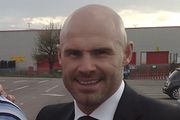

| Player | Goals | Season |
|---|---|---|
| 14 | 2009–10 | |
| 12 | 2008–09 | |
| 12 | 2007–08 | |
| 13 | 2006–07 | |
| 14 | 2005–06 | |
| 15 | 2004–05 | |
| 9 | 2003–04 | |
| 16 | 2002–03 | |
| 10 | 2001–02 | |
| 21 | 2000–01 | |
| 11 | 1999–2000 | |
| 20 | 1998–99 | |
| 24 | 1997–98 | |
| 20 | 1996–97 | |
| 15 | 1995–96 | |
| 23 | 1994–95 | |
| 8 | 1993–94 | |
| 21 | 1992–93 | |
| 18 | 1991–92 | |
| 13 | 1990–91 | |
| 10 | 1989–90 | |
| 8 | 1988–89 | |
| 20 | 1987–88 | |
| 23 | 1986–87 | |
| 21 | 1985–86 |
Notable players
See Walsall F.C. Players
|
|
|
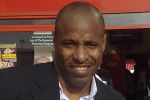
Clayton Ince
|
Club officials
Board officials
| Name | Role |
|---|---|
| Chairman | |
| Director | |
| Director | |
| Director | |
| Director | |
| Chief Executive | |
| Director | |
| President | |
| Honorary Life President |
Current management and coaching staff
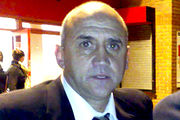
| Name | Role |
|---|---|
| Manager | |
| Football Consultant | |
| Head of Youth | |
| Youth Development Officer | |
| Assistant Manager | |
| Physio | |
| Assistant Physio |
Managerial history
This table is correct following the game against Huddersfield Town FC on 13 April 2010.
Walsall have had 32 full-time Post-War managers. The most recent managers are:
| Name | From | To | Played | Won | Drawn | Lost | Total Points Won^ | Total Points Won (%)^ | Honours |
|---|---|---|---|---|---|---|---|---|---|
| 20 January 2009 | Current | 69 | 24 | 18 | 27 | 90 | 43.47% | ||
| 22 May 2008 | 10 January 2009 | 27 | 10 | 4 | 13 | 34 | 42% | ||
| 3 May 2006 | 22 April 2008 | 74 | 34 | 17 | 23 | 119 | 53.6% | Promotion to League One 2007 | |
| 22 February 2006 | 24 April 2006 | 11 | 1 | 6 | 4 | 9 | 27.2% | ||
| 16 April 2004 | 6 February 2006 | 94 | 32 | 39 | 23 | 135 | 47.9% | ||
| 24 January 2002 | 16 April 2004 | 116 | 38 | 48 | 30 | 162 | 46.6% | ||
| 5 May 1998 | 22 January 2002 | 199 | 79 | 71 | 49 | 308 | 51.6% | Promotion to First Division 1999 & 2001 | |
| 25 June 1997 | 5 May 1998 | 62 | 26 | 23 | 13 | 101 | 54.3% | ||
| 1 August 1994 | 21 May 1997 | 157 | 71 | 45 | 41 | 258 | 54.8% | Promotion to Second Division 1995 | |
| 16 May 1990 | 2 September 1994 | 201 | 69 | 77 | 55 | 284 | 47.1% |
The above statistics include cup games, but not friendlies.
^ – Whilst not every game included in the table is a league game, a league-style points system has been used to better establish the effectiveness of the Manager in succeeding with the club.
All-time records
- All time attendance : 25,453 v. Newcastle United. Second Division, 29 August 1961.
- Attendance at Bescot Stadium : 11,049 v. Rotherham United. First Division, 9 May 2004.
- League Victory : 10–0 vs Darwen. Second Division, 4 March 1899.
- League Defeat : 0–12 vs Small Heath. Second Division, 17 December 1892.
- Cup Victory : 7–0 vs Macclesfield Town (away). FA Cup 2nd Round, 6 December 1997.
- Most Capped Player : Mick Kearns (15), Republic of Ireland.
- League appearances : Colin Harrison (467) 1964–1982.
- League Goals : 184. Colin Taylor 1958–1973 (three separate spells); and Tony Richards 1954–1963.
- League Goals in One Season : Gilbert Alsop (40). Division Three (North), 1933–34 and 1934–35.
- Transfer Fee Received : £1,000,000 for Scott Dann from Coventry City, January 2008.
- Transfer Fee Paid : £175,000 for Alan Buckley for Birmingham City, June 1979.
Honours
- Old Division Four Champions : 1959–60
- Old Division Three Runners-Up : 1960–61
- Old Division Four Runners-Up : 1979–80
- Old Division Three Play-Off Winners : 1987–88
- Division Three Runners-Up : 1994–95
- Division Two Runner-Up : 1998–99
- Division Two Play-Off Winners : 2000–01
- League Two Champions: 2006–2007
References
- ↑ "Walsall rename ground Banks's Stadium". Football Shirts. 11 May 2007. http://www.football-shirts.co.uk/fans/125. Retrieved 11 May 2007.
- ↑ "Up where we belong! Graydon upsets the odds to take Walsall into Division One.". Birmingham Evening Mail (England). 19 May 1999. http://www.highbeam.com/doc/1G1-60328191.html. Retrieved 5 July 2008.
- ↑ "Walsall break Reading hearts". BBC Sport. 27 May 2001. http://news.bbc.co.uk/sport1/hi/football/eng_div_2/1352124.stm. Retrieved 5 July 2008.
- ↑ "Swindon 1–1 Walsall". BBC Sport. 5 May 2007. http://news.bbc.co.uk/sport1/hi/football/eng_div_3/6602935.stm. Retrieved 5 July 2008.
- ↑ "Promoted Walsall's open top tour". BBC Sport. 8 May 2007. http://news.bbc.co.uk/1/hi/england/west_midlands/6636873.stm. Retrieved 5 July 2008.
- ↑ "Saddlers fans in sit-in protest". Express and Star. 10 May 2010. http://www.expressandstar.com/news/2010/05/10/saddlers-fans-in-sit-in-protest/. Retrieved 10 May 2010.
- ↑ "Walsall's Freedom of Speech Problem". When Saturday Comes. 19 May 2010. http://www.wsc.co.uk/content/view/5300/38/. Retrieved 19 May 2010.
- ↑ "Walsall Chief Exec fans the flames of protest". Football Supporters Federation. 13 April 2010. http://www.fsf.org.uk/news/walsall-chief-fans-the-flames-of-protest.php. Retrieved 14 May 2010.
- ↑ "Walsall, Cypriot Flags and Freedom of Speech". TwoHundredPercent. 13 May 2010. http://www.twohundredpercent.net/?p=6499. Retrieved 14 May 2010.
External links
|
||||||||
|
|||||
|
|||||||||||||||||||||||